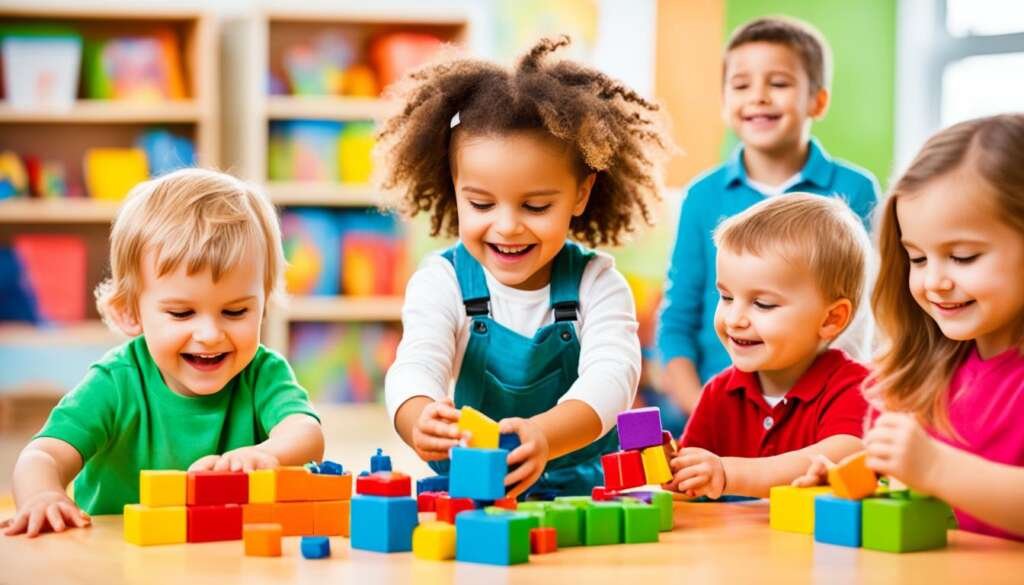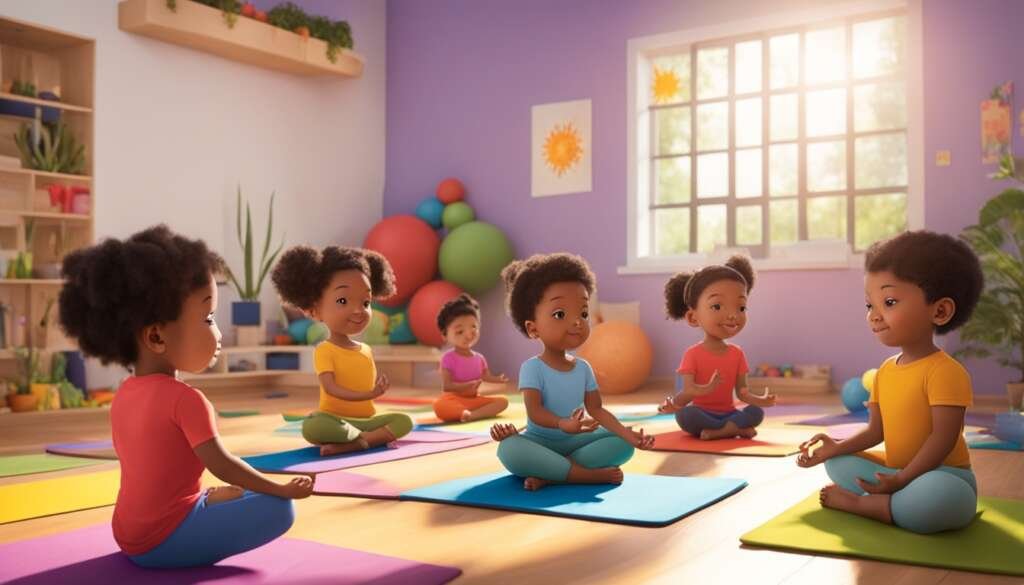Have you ever pondered how early childhood experiences influence a person’s life trajectory? Delving into self development preschool reveals its deep impact on young minds. This approach to early education emphasizes emotional intelligence and social skills, setting the stage for future achievements.
Occassionally I might feature some affiliate links in my articles. If you make a purchase through these links, I may earn a small commission at no extra cost to you. Thanks for supporting me.
Witnessing the effects of self development preschool, I’ve observed how it boosts children’s self-esteem during their formative years. It creates a nurturing space where young ones develop into confident, resilient beings. Let’s delve into how this method is transforming early education and molding the next generation of learners.
Understanding Self-Esteem in Preschoolers
As a child psychologist, I’ve observed the pivotal role of self-esteem in young learners. It profoundly influences their worldview and future achievements. Let’s explore what self-esteem entails for preschoolers and its developmental process.
Defining Self-Esteem for Young Learners
Self-esteem in preschoolers reflects their perception of their own value and capabilities. It encompasses their beliefs about their worth. The development of a child’s self-esteem begins early, significantly affecting their emotional intelligence.
Factors Influencing Preschoolers’ Self-Perception
Various elements shape a child’s self-image. Experiences at home, with peers, and in preschool significantly contribute. Positive interactions enhance confidence, whereas negative ones can erode it. A well-structured preschool curriculum can foster healthy self-esteem development.
The Role of Family, Peers, and Teachers
Family sets the groundwork for self-esteem. Peers introduce social dynamics and learning from others. Teachers create an environment for exploration and growth. Together, they form a supportive network that nurtures a child’s self-worth.
| Influence | Impact on Self-Esteem |
|---|---|
| Family | Builds core self-worth |
| Peers | Offers social comparison |
| Teachers | Provides structured growth |
Understanding these influences aids in crafting environments where preschoolers can flourish. It enables them to develop robust, positive self-perceptions.
Signs of Positive and Low Self-Esteem in Preschoolers
Preschoolers with high self-esteem show confidence in their social interactions. They actively engage in group activities and are open to new experiences. They view mistakes as chances to learn, not failures.
However, low self-esteem in young children manifests in different ways:
- They hesitate to join group activities
- They often talk negatively to themselves
- They give up quickly when faced with challenges
- They struggle to express their thoughts and feelings
As a preschool educator, I’ve seen that mindfulness can uplift self-esteem in kids. Simple practices like deep breathing or guided imagery help them manage emotions and build a positive self-view.
Identifying these signs early lets us offer specific support. By creating a supportive environment and promoting positive self-talk, we aid preschoolers in developing robust self-esteem. This foundation is crucial for their social and academic success.
Self Development Preschool: Strategies for Building Positive Self-Esteem
In preschool teaching, building positive self-esteem is crucial. A nurturing environment is essential for kids to flourish. Let’s delve into effective strategies to enhance young learners’ confidence and self-worth.
Creating a supportive learning environment
A supportive classroom is vital for emotional intelligence. I ensure each child feels valued and heard. This involves active listening and responding with empathy. Positive discipline techniques maintain a respectful atmosphere, allowing kids to express themselves freely.
Encouraging effort and perseverance
I emphasize praising effort over just results. This approach cultivates resilience and a love for learning. When faced with challenges, I guide them to problem-solve, enhancing their confidence in their abilities.
Fostering a growth mindset
Teaching kids that their abilities can grow with effort is essential. I use phrases like “You’re learning!” instead of “You’re smart!” This mindset views challenges as opportunities for growth, not obstacles.
Celebrating individuality and strengths
Every child is distinct. I focus on recognizing and celebrating each child’s strengths. This could be through special projects or sharing time where kids showcase their talents. By valuing their individuality, we lay a strong foundation for positive self-esteem.
These strategies foster a positive learning environment. In this setting, preschoolers develop healthy self-esteem and emotional intelligence. It’s remarkable to witness how these approaches shape confident, resilient young learners.
Cultivating Curiosity: Activities to Promote Self-Development
I am passionate about creating engaging preschool activities that ignite curiosity and support self-development. These activities not only enhance social skills but also introduce mindfulness for kids through play.
The ‘Yet’ Pathway
The ‘Yet’ Pathway is an excellent tool for fostering a growth mindset. When a child says, “I can’t do it,” I suggest they add “yet” to their statement. This simple change helps shift their perspective from fixed to growth-oriented.
Mistake Masters
Our Mistake Masters game teaches kids to see mistakes as opportunities for growth. We celebrate “beautiful oops” moments, transforming mishaps into creative ventures. This approach aids in building resilience and problem-solving abilities.

Interactive Games for Young Learners
Interactive games are a great way to enhance social skills and teamwork. The Kindness Challenge Quest motivates children to perform acts of kindness. Escape Room Adventures, on the other hand, promote problem-solving and collaboration.
Reflection and Self-Awareness Exercises
To conclude our preschool activities, we focus on mindfulness for kids through reflection exercises. We utilize growth mindset journals where children document their daily achievements, no matter how minor. This practice enhances self-awareness and confidence.
| Activity | Skills Developed | Benefits |
|---|---|---|
| The ‘Yet’ Pathway | Perseverance | Fosters growth mindset |
| Mistake Masters | Resilience | Encourages learning from errors |
| Kindness Challenge Quest | Empathy | Promotes positive social interactions |
| Growth Mindset Journals | Self-reflection | Builds self-awareness and confidence |
The Power of Positive Affirmations and Role-Playing
Positive affirmations and role-playing have revolutionized preschool education. They delve into child psychology, enhancing emotional intelligence. This creates a supportive environment for young learners.
Positive affirmations are a simple yet potent tool. They foster a growth mindset and instill confidence in kids. I begin each day by having the children repeat, “I can do hard things!” or “My brain grows when I make mistakes!” These phrases become their personal mantras, boosting their self-belief.
Role-playing is another valuable method I employ. It enables children to navigate various scenarios and emotions safely. We might act out resolving conflicts or expressing feelings. This approach enhances their self-assurance and empathy.
| Activity | Benefits | Example |
|---|---|---|
| Positive Affirmations | Builds confidence, encourages growth mindset | “I am capable of learning new things!” |
| Role-Playing | Develops social skills, enhances emotional intelligence | Acting out sharing toys with a friend |
| Empowerment Scenarios | Boosts self-esteem, teaches problem-solving | Pretending to overcome a fear of heights |
Integrating these activities into daily routines significantly uplifts children’s self-esteem. By combining positive affirmations with role-playing, we equip preschoolers with essential tools for emotional and self-development throughout their lives.
Conclusion: Empowering Preschoolers for Lifelong Growth
In my exploration of self development preschools, I’ve seen their profound effect on young minds. These approaches provide essential tools for building self-esteem and confidence. They instill a growth mindset and promote positive self-talk, preparing children for a self-assured future.
Early childhood education is key in developing emotional intelligence. Through play and reflection, children gain a deeper understanding of themselves and others. This foundation is crucial for success in all areas of life, as the National Association for the Education of Young highlights.
By adopting these self development strategies, we’re not just preparing kids for kindergarten. We’re empowering them for a lifetime of growth. Educators and parents must create environments where children can flourish, gain confidence, and develop a love for learning. This approach ensures emotionally intelligent, self-aware individuals ready to face future challenges boldly.
FAQ
What is self-esteem in preschoolers?
Self-esteem in preschoolers is about how they see and value themselves. It includes their beliefs about their abilities, worth, and overall self-image. Their family, friends, and teachers play a big role in shaping this.
Why is positive self-esteem important for preschoolers?
Positive self-esteem is key for preschoolers’ growth and happiness. It helps them be confident in sharing their thoughts and feelings. They become more willing to try new things, handle mistakes well, and value themselves. It also helps them be kind and empathetic.
What are the signs of low self-esteem in preschoolers?
Low self-esteem in preschoolers shows as a lack of confidence, negative thoughts about themselves, and staying away from others. Spotting these signs lets caregivers and teachers help them feel better supported and encouraged.
How can I create a supportive learning environment for building self-esteem?
For a supportive environment, offer love, support, and encouragement. Make sure they have a safe space to explore and guide them through challenges. Encourage healthy friendships and celebrate what makes each child unique.
What is the ‘Yet’ Pathway, and how does it promote self-development?
The ‘Yet’ Pathway uses the word ‘yet’ to show that learning and growth are ongoing. It teaches children to see challenges as chances to grow. This mindset helps them feel empowered to tackle obstacles.
How can positive affirmations and role-playing activities support self-esteem development?
Positive affirmations boost confidence and help kids tackle challenges with a positive attitude. Role-playing lets them practice social and emotional skills. It builds their confidence and deepens their understanding of themselves and others.

